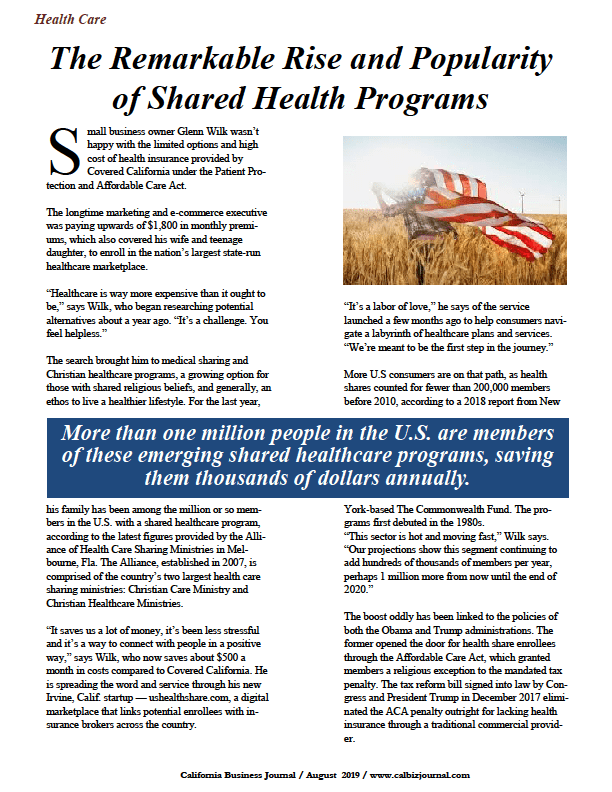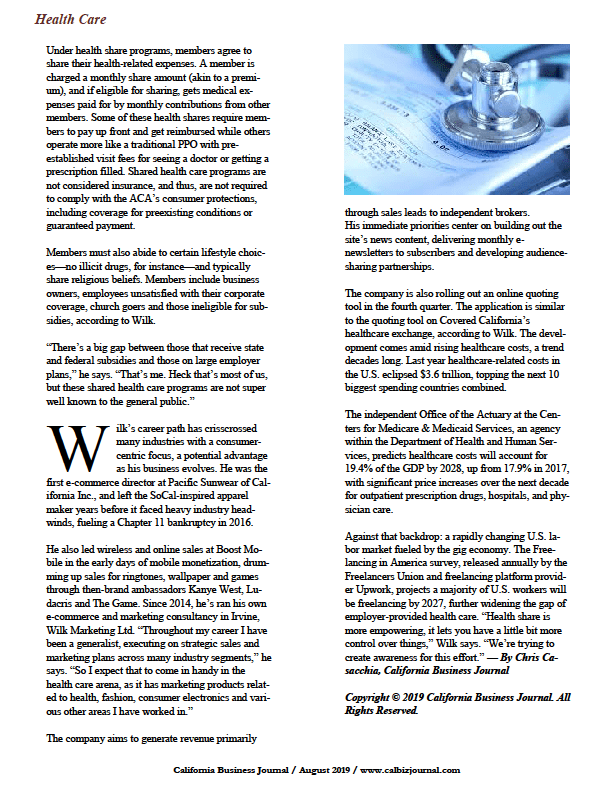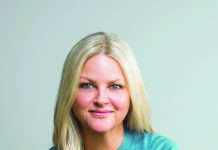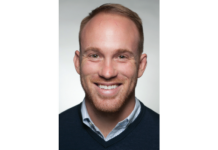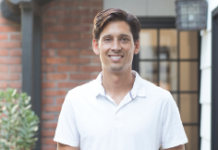(sponsored)
More than one million people in the U.S. are members of these emerging shared healthcare programs, saving them thousands of dollars annually.

By Chris Casacchia, California Business Journal.
Small business owner Glenn Wilk wasn’t happy with the limited options and high cost of health insurance provided by Covered California under the Patient Protection and Affordable Care Act.
The longtime marketing and e-commerce executive was paying upwards of $1,800 in monthly premiums, which also covered his wife and teenage daughter, to enroll in the nation’s largest state-run healthcare marketplace.
“Healthcare is way more expensive than it ought to be,” says Wilk, who began researching potential alternatives about a year ago. “It’s a challenge. You feel helpless.”
The search brought him to medical sharing and Christian healthcare programs, a growing option for those with shared religious beliefs, and generally, an ethos to live a healthier lifestyle. For the last year, his family has been among the million or so members in the U.S. with a shared healthcare program, according to the latest figures provided by the Alliance of Health Care Sharing Ministries in Melbourne, Fla. The Alliance, established in 2007, is comprised of the country’s two largest health care sharing ministries: Christian Care Ministry and Christian Healthcare Ministries.
“It saves us a lot of money, it’s been less stressful and it’s a way to connect with people in a positive way,” says Wilk, who now saves about $500 a month in costs compared to Covered California.
 He is spreading the word and service through his new Irvine startup, ushealthshare.com, a digital marketplace that links potential enrollees with insurance brokers across the country.
He is spreading the word and service through his new Irvine startup, ushealthshare.com, a digital marketplace that links potential enrollees with insurance brokers across the country.
“It’s a labor of love,” he says of the service launched a few months ago to help consumers navigate a labyrinth of healthcare plans and services. “We’re meant to be the first step in the journey.”
More U.S consumers are on that path, as health shares counted for fewer than 200,000 members before 2010, according to a 2018 report from New York-based The Commonwealth Fund. The programs first debuted in the 1980s.
“This sector is hot and moving fast,” Wilk says. “Our projections show this segment continuing to add hundreds of thousands of members per year, perhaps 1 million more from now until the end of 2020.”
The boost oddly has been linked to the policies of both the Obama and Trump administrations. The former opened the door for health share enrollees through the Affordable Care Act, which granted members a religious exception to the mandated tax penalty. The tax reform bill signed into law by Congress and President Trump in December 2017 eliminated the ACA penalty outright for lacking health insurance through a traditional commercial provider.
Under health share programs, members agree to share their health-related expenses. A member is charged a monthly share amount (akin to a premium), and if eligible for sharing, gets medical expenses paid for by monthly contributions from other members. Some of these health shares require members to pay up front and get reimbursed while others operate more like a traditional PPO with pre-established visit fees for seeing a doctor or getting a prescription filled. Shared health care programs are not considered insurance, and thus, are not required to comply with the ACA’s consumer protections, including coverage for preexisting conditions or guaranteed payment.
Members must also abide to certain lifestyle choices—no illicit drugs, for instance—and typically share religious beliefs. Members include business owners, employees unsatisfied with their corporate coverage, church goers and those ineligible for subsidies, according to Wilk.
“There’s a big gap between those that receive state and federal subsidies and those on large employer plans,” he says. “That’s me. Heck that’s most of us, but these shared health care programs are not super well known to the general public.”
Wilk’s career path has crisscrossed many industries with a consumer-centric focus, a potential advantage as his business evolves. He was the first e-commerce director at Pacific Sunwear of California Inc., and left the SoCal-inspired apparel maker years before it faced heavy industry headwinds, fueling a Chapter 11 bankruptcy in 2016. He also led wireless and online sales at Boost Mobile in the early days of mobile monetization, drumming up sales for ringtones, wallpaper and games through then-brand ambassadors Kanye West, Ludacris and The Game.
Since 2014, he’s ran his own e-commerce and marketing consultancy in Irvine, Calif., Wilk Marketing Ltd.
“Throughout my career I have been a generalist, executing on strategic sales and marketing plans across many industry segments,” he says. “So I expect that to come in handy in the health care arena, as it has marketing products related to health, fashion, consumer electronics and various other areas I have worked in.”
The company aims to generate revenue primarily through sales leads to independent brokers. His immediate priorities center on building out the site’s news content, delivering monthly e-newsletters to subscribers and developing audience-sharing partnerships.  The company is also rolling out an online quoting tool in the fourth quarter. The application is similar to the quoting tool on Covered California’s healthcare exchange, according to Wilk.
The company is also rolling out an online quoting tool in the fourth quarter. The application is similar to the quoting tool on Covered California’s healthcare exchange, according to Wilk.
The development comes amid rising healthcare costs, a trend decades long. Last year healthcare-related costs in the U.S. eclipsed $3.6 trillion, topping the next 10 biggest spending countries combined.
The independent Office of the Actuary at the Centers for Medicare & Medicaid Services, an agency within the Department of Health and Human Services, predicts healthcare costs will account for 19.4% of the GDP by 2028, up from 17.9% in 2017, with significant price increases over the next decade for outpatient prescription drugs, hospitals, and physician care.
Against that backdrop: a rapidly changing U.S. labor market fueled by the gig economy. The Freelancing in America survey, released annually by the Freelancers Union and freelancing platform provider Upwork, projects a majority of U.S. workers will be freelancing by 2027, further widening the gap of employer-provided health care. “Health share is more empowering, it lets you have a little bit more control over things,” Wilk says. “We’re trying to create awareness for this effort.”
Copyright © 2019 California Business Journal. All Rights Reserved.


